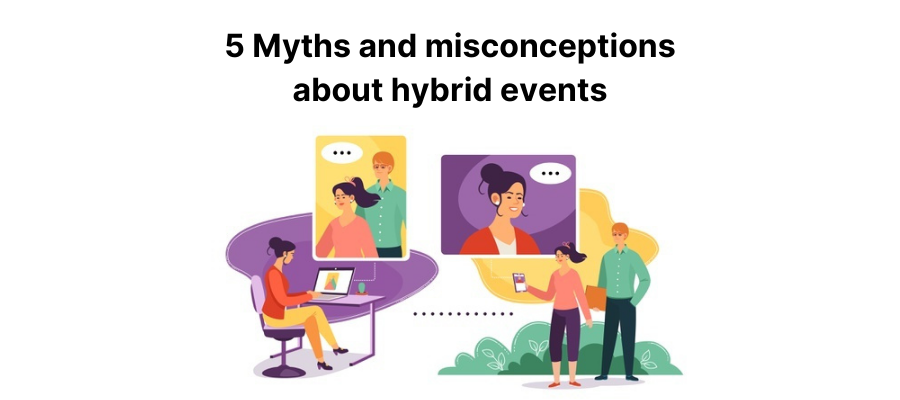5 Myths and misconceptions about hybrid events
January 15, 2022

By now every type of business has become aware of the benefits of hosting hybrid events. So far so that for many organizations virtual events have become part of their audience engagement strategy. However, many organizations are still slow in the adoption of technology. Those who have acclimatized themselves to this mode of communication are reaping its benefits and are able to gain a great competitive advantage.
Despite obvious benefits, many businesses are still far from utilizing this technology to their benefit due to many prevailing misconceptions.
5 Myths and misconceptions about hybrid events
Myth 1: A hybrid event is just about streaming a live event
This is the most misconception prevailing about all types of hybrid events. However, these types of events are a mix of live and virtual events and thus this misconception arises. But merely live streaming your event does not make it a hybrid event. Let’s find out what are different types of hybrid events businesses can host.
-
Lite hybrid event
In this type of event live streaming is done via a virtual event management platform. This type of arrangement allows the audience to have a complete event experience while still being able to interact, engage and participate in Q&A sessions, etc.
-
Complex hybrid event
This type of arrangement allows you to take your events to take up a notch by facilitating virtual and live events at the same time. In other words, it allows you to conduct both events simultaneously. This type of arrangement enables event organizers to allow attendees from both events to interact with each other via chat, discussion boards, and Q&A rounds, etc. If not, they also have the flexibility to limit interactions and access to content for any one event.
Thus all in all for hybrid events, audience engagement is the key differentiating factor.
Myth 2: Virtual event hosting will negatively impact your live event attendance
Virtual events are definitely not a distraction from live events. On the contrary, hosting a virtual event simultaneously with an in-person event creates value addition for attendees who have never attended any event before. Additionally, it allows businesses to reach a global audience rather than being limited to the local audience.
Moreover, it also happens that virtual events create motivation among participants to attend an in-person event. This means virtual events ultimately complement an in-person event and help businesses in effectively marketing their event. Thus creating plenty of opportunities for business owners to network and attract potential new clients.
Myth 3: Planning and executing hybrid events is difficult
Any type of event, whether in-person or hybrid requires a clear understanding of objectives, audience requirements, and effective planning. Nevertheless, the process is not so complex. With the help of online event management software, hybrid events can be managed efficiently and effectively.
On the other hand, engaging an audience in a virtual event has different requirements from that of an in-person event. The ultimate goal of any event is to give your audience a memorable experience that will inspire them to stay connected to your business. In the case of hybrid events, event organizers must manage both, virtual as well as live event audiences and make them feel part of the same event.
An online event management software helps event organizers to create a definite structure for events and thus execute it within the stipulated time. When used effectively these technology-based tools make the whole organizing process hassle-free.
Myth 4: Hybrid events fail to create a personalized experience
Events feel more personalized when participants are able to freely interact with each other, participate in Q&A sessions, and receive exclusive access to event content.
Another way to make events personalized for the audience is to make them become part of your organization’s story. You can showcase an organization’s evolution story via a video, show small snippets of staff efforts and their contribution towards the organization, etc. Also, you can send personalized invites, messages to participants to provide that extra touch.
Myth 5: Sponsors would not be interested in hybrid events
This is absolutely not true. Having a virtual presence has become important for all types of businesses to evolve and grow. Thus it is well understood within the industry that both online, as well as in-person types of interactions, only increase their opportunity to reach a wider audience. As result sponsors are more than willing to come on board for hybrid event sponsorship. In return, they get the dual benefit of increased reach and increased opportunity to gain new clients.
Final word
Hybrid events provide a unique opportunity for businesses to cater to a large audience and gain a competitive advantage while allowing them to make the best use of resources. If you are still unsure about hybrid events, get in touch with us immediately.

